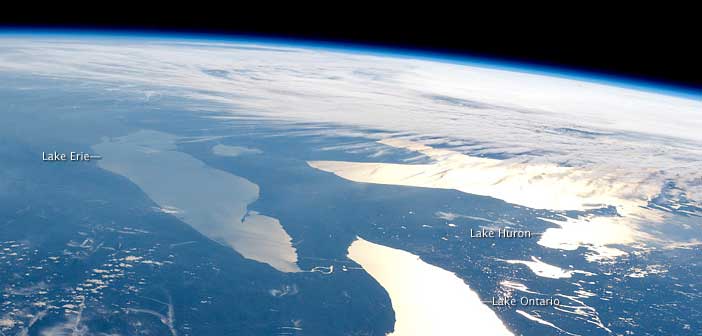GEORGIAN BAY – A representative of Restore Our Water International (ROWI) says news of the International Joint Commission (IJC) giving the green light earlier this week to increase Lake Ontario outflows to prepare for possible flooding is great to hear for residents in Michigan and for water levels on Lake Ontario, but that similar action should be taken to reduce water levels in Lakes Huron/Michigan and Georgian Bay.
“This is excellent news for those on Lake Ontario and Michigan; I just wish something similar could be in place for Lakes Huron/Michigan and Georgian Bay,” stated Mary Muter of ROWI. “But they (IJC) and (the International Lake Superior Board of Control) are ignoring the middle Great Lakes. They could do something similar to reduce our water levels. They could cut back now and in the winter, that would lower the lake levels (in Georgian Bay).”
As was reported on December 14, in anticipation of high volumes of water entering Lake Ontario in 2021, the IJC has granted pre-emptive permission to deviate from its controversial Plan 2014 and increase outflows in an attempt to avoid flooding.
On the IJC website dated December 11, 2020, it is reported the IJC has approved the International Lake Ontario-St. Lawrence River Board to deviate from Plan 2014 and as conditions permit, outflows from the Moses-Saunders dam on the St. Lawrence River can be increased to exceed Plan 2014 flows.
Roger Gauthier, chair, and Ms. Muter, vice-chair of ROWI in a letter to the Canadian and US commissioners of the IJC, dated December 10, wrote, “our organization (ROWI) represents shoreline property owner organizations on both the US and Canadian sides of Lakes Michigan and Huron and along Georgian Bay. This letter is a follow-up to our correspondence dated August 18, 2020 and your subsequent response of September 29, 2020.”
“Regardless of your rationalizations, management of Lake Superior outflows have had a material and significant impact on setting new record high levels on Lakes Michigan, Huron, St. Clair and Erie as well as on Georgian Bay,” the ROWI letter reads. “Our request in our prior letter was largely ignored in your response; that is, for the IJC to deviate from flawed Plan 2012 outflows and hold more water back on Lake Superior, until such time as the middle Great Lakes attain a level of parity with the upstream lake. The IJC has the authority to direct this deviation but will not act on the clear evidence on hand. The IJC has acted to address similar concerns from Lake Ontario interests, thereby showcasing your inherent bias to this part of the overall system.”
“The co-ordinated forecasts for all of the Great Lakes updated in early December now show that Lake Superior (and to a lesser degree Lake Ontario) are forecasted to stay below their recorded highs through May, 2021,” the letter continues. “However, Lakes Michigan-Huron, St. Clair and Erie all have a potential for exceeding prior record highs during the same period. Holding water back on Lake Superior is imperative now!”
“Your response further ignored the plea to comprehensively re-evaluate the shortcomings of Plan 2012. Our contention is that Plan 2012 inherently ignores the non-stationarity (nature) of outflows through the St. Clair-Detroit river system. The IJC’s control board for Lakes Superior and Ontario have little or no direct engagement with assessing the changing conveyance in the St. Clair-Detroit River system.”
ROWI wrote, “the IJC’s answers to questions proffered during our last webinar indicate that US Army Corps of Engineers maintains a comprehensive conveyance change monitoring program for this system and has conducted bathymetric surveys of the St. Clair River. However, the basic data and their analyses have been neither published nor peer reviewed. Why should shore property owners accept that there is some program existing that fails to publish its results?”
“Furthermore, as an organization, we requested access to the minutes of the Co-ordinating Committee on Great Lakes Basic Hydraulics and Hydrology through a (Freedom of Information Act) request in May, 2020. This request was submitted to assess whether governments were transparent in generating such results from taxpayer investments as the requested minutes would provide. To date, we have not been provided this information but rather have been told that it has some form of diplomatic immunity from FOIA as it supports IJC actions. We should remind you that transparency in government is essential for public confidence. Simply saying that a comprehensive program exists without products is misleading to say the least,” the letter continues.
“Furthermore, the IJC has failed to react to our request for the formulation of a ‘St. Clair-Detroit River Working Committee’ under the IJC that includes appropriate riparian representation. The International Great Lakes Adaptive Management Committee has shown over its five-year history that it ignores issues related to the balancing of water levels on the upper Great Lakes. It is time for the IJC to address the regional biases and preferences afforded to hydropower and commercial navigation and Lake Superior interests to the exclusion of those of the other lakes,” the ROWI letter adds.





